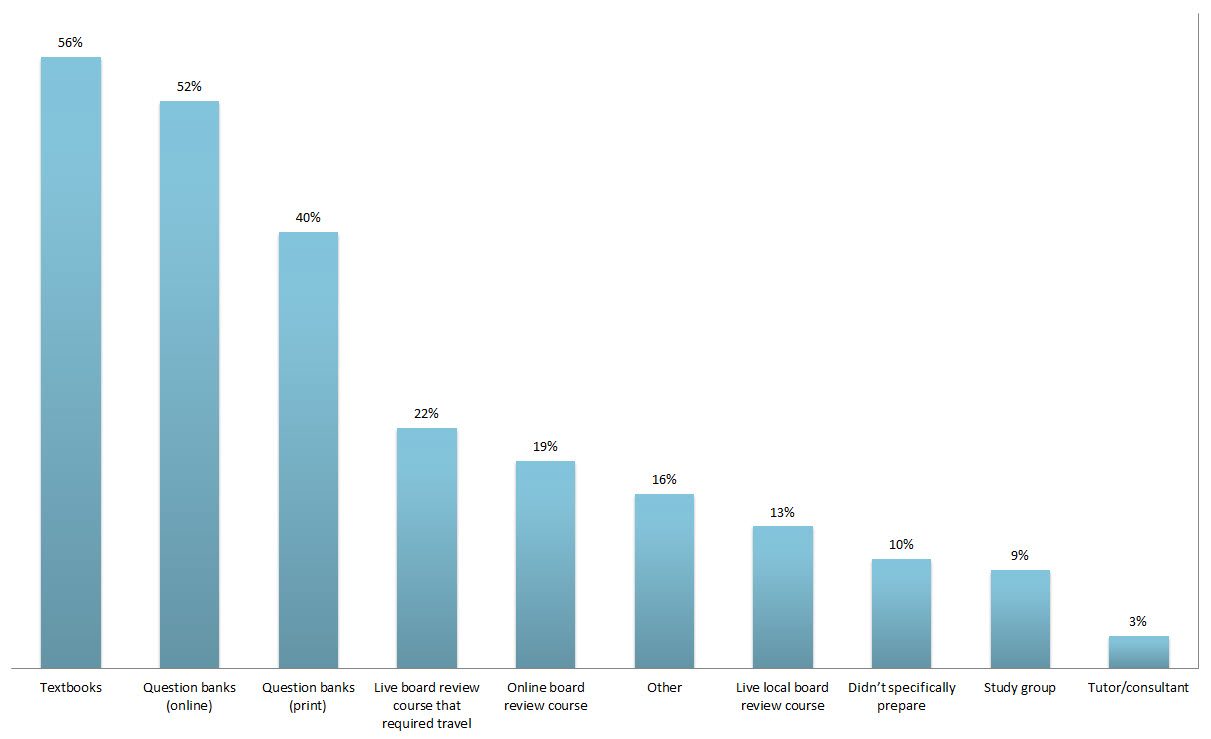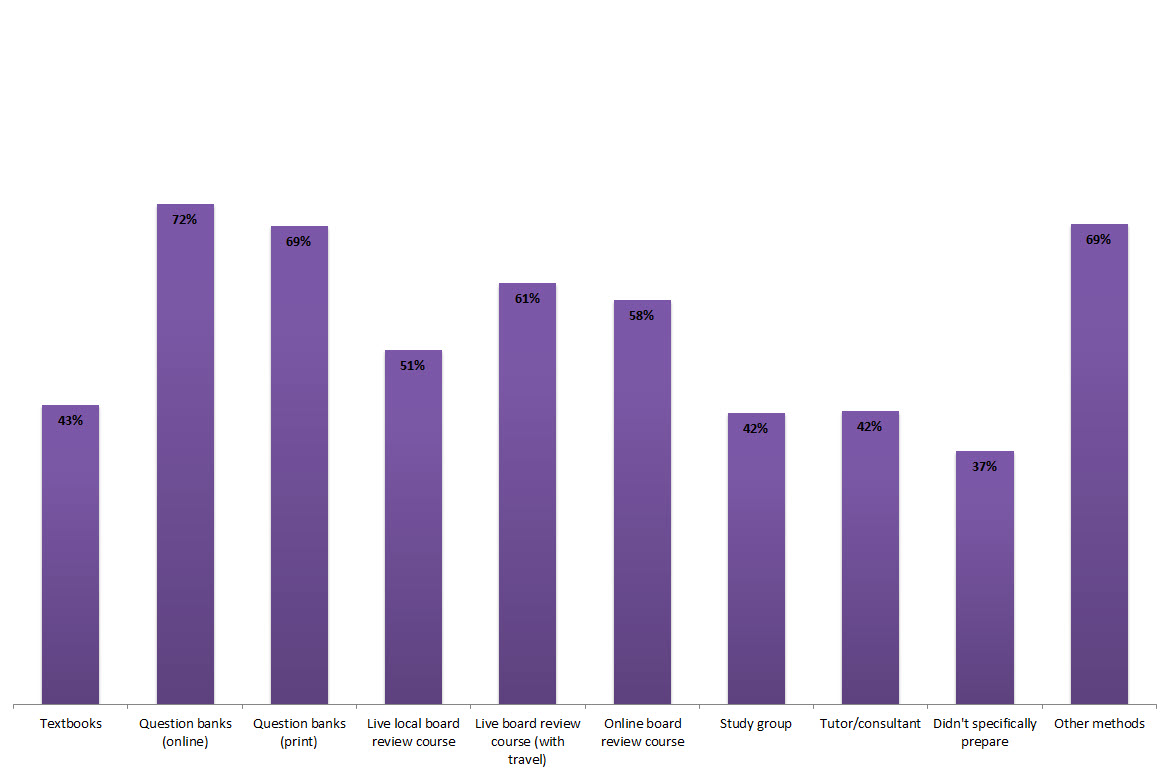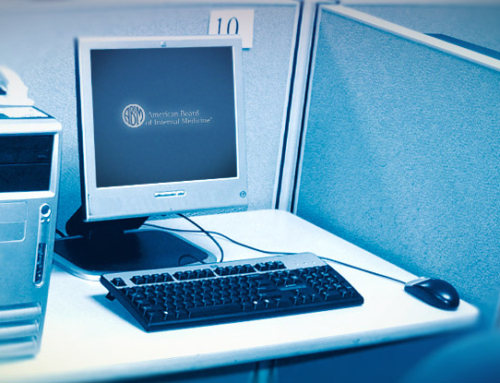A survey of Physician’s First Watch readers we conducted a few years back found that physicians used question banks and textbooks much more frequently than internal medicine board review courses. Now that the pandemic has accelerated the trend away from in-person adult learning, it’s likely that even fewer physicians opt to travel to board review courses. But if you are considering signing up for one, we think you will still find the data from the survey and advice from the physicians we interviewed valuable.
Most Effective Methods for Studying for the Internal Medicine Board Exam

In rating the effectiveness of their study methods, physicians rate internal medicine board review courses somewhat more favorably than independent study using textbooks (the most widely-used method), but somewhat less favorably than independent study using print or online question banks.
Study Methods: Percent of “Highly Effective” Ratings

Plenty of Options for Internal Medicine Board Review Courses
Out of several options — courses offered locally, those requiring travel, prerecorded, self-pacing, and online courses — board review courses requiring travel edge out the more convenient options for perceived efficacy, according to our physician survey.
The Best Internal Medicine Board Review Course
The best internal medicine board review course for you will depend on many personal factors ranging from cost to your preferred way of learning. To help you determine which factors are most important to you, we interviewed a number of our survey participants to find out their reasons for enrolling in internal medicine board review courses and the criteria they used for selecting specific course offerings.
ABIM Board Review Course: Reasons for Attending
Key reasons physicians shared for enrolling in an ABIM board review course included:
- Fear of not passing their exams or not feeling confident about how to focus their studies independently.
- Learning-style preferences for visual/audio presentations and/or interactivity with other people.
- Desire to study specific exam-style questions and to benefit from multiple expert lecturers teaching to established exam blueprints.
“[Both of the courses I took] were appealing because of their structure,” said Dr. Roy Kao, who achieved his initial ABIM internal medicine board certification in 2011 and certified in pediatrics the following year. “Over the course of about a week, different experts in subspecialty fields and general medicine went over important high-yield topics in a systematic fashion that is attuned to the content specifications and previous question formats of the board exams.”
Reputation, Time, and Cost
In choosing specific internal medicine board review courses, most physicians appear to strongly consider producer reputation, time, and cost. For example, in studying for his spring 2014 ABIM recertification exam, general internist Dr. Reynaldo Alonso of the Bronx, NY knew his learning preference would be for a live course:
I do better with listening than with studying from a textbook or computer screen. While I would have preferred a live course, I could not take the time off to travel for the course I wanted. Instead, I purchased the recorded/audio version, which was less expensive and allowed me to break up my studying into smaller time increments — an hour or two during evenings or weekends — and to fit the studying more easily into my schedule.
As a practicing general internist who makes regular efforts to stay up to date in his medical knowledge, Dr. Alonso said that the approximately 20-hour audio course was just right for his needs.
I would think the internal medicine board exam might be more daunting for those who have specialized in their careers but still wish to maintain their internal medicine certifications. As a general internist, I see many different things every day in practice, so this course was all I really needed to feel confident and to pass my exam.
Dr. Kao, also shared that he has chosen both live and prerecorded (DVD) courses; again, his choice was driven primarily by the criteria of reputation, time, cost, and proximity.
For my internal medicine boards, I chose a live course, but for pediatrics, I selected a DVD course. I chose the live course because it was relatively nearby, and I had an opportunity to stay with friends. I was also able to take off an entire week to devote to the course. My residency program provided educational funding, and the course was created by a reputable organization. Also, there was no DVD option for the particular course I had chosen, while other DVD courses were available to me through my residency library.
For pediatrics, I chose a DVD option due, again, to the course creator’s reputation and my own previous experience taking DVD courses offered by the particular producer. While there was a live course option, the distance was too far from home and travel was not feasible for me. I also appreciated the ability to slow down and speed up the DVD and to repeat sections to fit my own pace of review.
At the time of the survey, Dr. Holli Hamilton, who might be considered a “super certifier,” held multiple certifications in internal medicine, infectious disease, and preventive medicine and public health. She had passed at least six board certification exams. She also, throughout her career as a government researcher, enrolled in an even larger variety of internal medicine board review courses (local, distant, and online or self-administered).
The real benefit with online courses is that you can log in anytime, so they are a good fit when you cannot put together the blocks of time needed for live courses. When my children were small, I will admit I preferred the longer-distance courses, because being away from the daily demands of family life made it much easier to focus on review. When you attend courses locally, it can be more difficult to separate from your daily concerns and to focus only on the course material.
While Hamilton’s overall approach to medical learning places her firmly in the “lifelong learner” camp — she keeps up with medical journals, leverages the Testing Effect, and has even participated as a board-exam beta tester — she does feel that board review courses can be effective supplements to other forms of learning and studying.
Medicine grows more complicated each year, and the knowledge base is growing exponentially. It can be particularly difficult for those who have specialized to go back and recertify in general internal medicine because they don’t see all the things general internists see frequently in practice. The reverse is also true. Subspecialty exam segments can include questions around rare occurrences of diseases that specialists would know but that would be rare for generalists to ever see. While I believe the certifying boards need to become better at segregating exam questions for different types of physicians, board review courses are a great way for people to discover their weaknesses and understand how to direct more in-depth studies in preparation for their exams.
 Fitting Internal Medicine Review Courses into Your Schedule
Fitting Internal Medicine Review Courses into Your Schedule
Deciding when to schedule an internal medicine review course can be somewhat tricky. On the one hand, physicians may be inclined to enroll in courses very close to their exam dates in order to maximize memory retention of the material covered. Dr. Hamilton advises a different tactic:
You want to take your course far enough ahead of time for it to be useful in directing supplemental study. Internal medicine board review courses will often cover newer content that you might need to know. They are very good at bringing physicians up-to-date in areas where they may not have concentrated their own consumption of medical research, journals, and so forth. Board review courses are a great way to gain insights into the areas where you need to study more and review relevant research and literature prior to taking your exam. You want to make sure that you leave yourself sufficient time to do that follow-up study.
Dr. Kao would agree:
Both of the courses I took were psychologically reassuring. While the universe of what there is to know in medicine is almost infinite, it was a relief to know it is possible to go through [what the boards view as] the most important points of medicine in one week! That way I could focus more on the parts of the review course in which I had weaknesses. This helped my confidence more than anything else. When I actually took the boards, I based my answers for 50% of the questions on practical experience; another 30% of my answers were based on experience with practice questions. The number of extra questions I could answer because of the board review courses was probably between 5 and 20%, but that small margin was very comforting in terms of helping me to prioritize my time.
 Lifelong Learning vs. IM Board Review Courses
Lifelong Learning vs. IM Board Review Courses
An interesting perspective on internal medicine board review courses and preparation for board certification in general came from Dr. John Wolfe Blotzer, who has worn many hats throughout his medical career, including chief resident, fellow, educator, academic dean, residency program director, clinical practitioner, and even a board-review course lecturer.
At the time of the survey, Dr. Blotzer had recently retired, but still held multiple board certifications (internal medicine, rheumatology, and geriatrics). He had lifelong certification in internal medicine, but still chose to undergo regular assessments of his medical knowledge and to recertify at recommended (albeit not required) intervals throughout his career.
I believe all physicians have an ethical duty to stay up-to-date with their medical knowledge and have never believed that I should be held to a different standard than others in the field. In the early 2000s, I sat for three board exams within a short time frame. It was exhausting, but I truly believe in the importance of keeping up-to-date.
As for his own study methods, Dr. Blotzer, like Hamilton, fell more into the “lifelong learner” category, voraciously consuming medical journals, compilations of medical research abstracts (such as NEJM Journal Watch), taking frequent advantage of self-assessment tools (such as NEJM Knowledge+ Internal Medicine Board Review assessments) and also regularly sharing and discussing interesting medical content with his colleagues.
As an experienced medical educator who has also studied faculty and curriculum development, I don’t believe the lecture format is a particularly good way to teach. I am more in favor of taking a consistent and systematic approach to updating medical knowledge every day. I believe you acquire and retain more knowledge by taking in small amounts each day, using questions to test your retention and going back to study and expand your knowledge around the answers you get wrong. My own approach is to look at questions and really try to research the answers where I either don’t know or answer incorrectly.
That approach must have worked as Dr. Blotzer passed each certification or recertification exam both with high scores and without other specific preparation or board review courses. What is more, he felt the examinations had become easier over time as a result of making studying and learning a routine part of his practice.
Asked how he might advise others who are preparing for medical board certification and considering courses, Dr. Blotzer said that, above all else, he would recommend introspection about individual learning styles, understanding varying practice settings (for example, academic versus purely clinical), and maintaining habits for staying up-to-date with medical knowledge.
There is no single best approach to preparing for medical board exams. When someone asks me for advice, my first question is always going to be: “How do you learn?”
Dr. Kao, for his part, advises taking time off from practice and ensuring focused and well-structured study time. “Doing so can be extremely helpful, especially early in the studying process, because it is important to be able to identify specific knowledge deficits and to direct further intensive review. I might also urge my colleagues to consider DVD or other self-regulated courses, as they allow people to move at their own pace.”
Whether you sign up for an internal medicine board review course or decide to avoid the cost, travel, and time commitment, NEJM Knowledge+ Internal Medicine Board Review can help! With the largest internal medicine question bank available, two ABIM practice exams, and the most advanced adaptive learning technology that provides the fastest, most efficient path to knowledge acquisition, Internists everywhere are choosing NEJM Knowledge+ Board Review to successfully prepare for and pass the ABIM exam.
Additional Internal Medicine Board Review Resources
- ABIM Study Plan
- Survival Guide for ABIM Exam Day
- Study for IM Boards on the Stairmaster
- Your Guide to ABIM MOC Requirements
- Residency as a Study Tool
- Internal Medicine Question Banks









